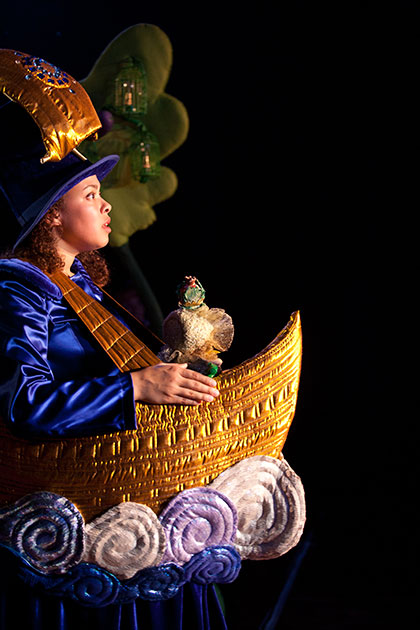Once upon a time, in 1981, there were two men, a woman and a passion for theatre. Oily Cart, which specialises in theatre for young children and for those with special needs and disabilities (SEND) was on the way. Tim Webb shares memories and reflections with Susan Elkin in celebration of the company’s 35th anniversary.
“I was always interested in theatre, new writing and different ways of staging it” says Tim Webb, remembering the Victoria Theatre in his home town of Stoke on Trent. “It was configured in the round so I grew up thinking that arena theatre was normal. After a BA in English, an MA in theatre and “a lot of acting” he went to work at Citizens Theatre in Glasgow as assistant stage manager where he met the future Mrs Webb, who works today as Oily Cart’s designer under the name Claire de Loon. He did theatre in education in Glasgow, and in south London before going home to Stoke as assistant director.
Various jobs followed including Kids Club coordinator and heading up a Family Workshop Unit for the Inner London Education Authority, He also started a double act with Dave Bennett (today, Oily Cart’s Head of Music, under the name Max Reinhardt) doing Punch and Judy shows with a difference. “We called it Exploding Punch and Judy and included pyrotechnics” recalls Tom who is very funny about the number of swazzles (six) he has swallowed in the pursuit of the right voice for Mr Punch. They got bookings for children’s parties, in parks, were very busy and learned a lot.
“But Dave wanted to get back to music and I wanted to get back to writing” says Tim. “Then we saw an Australian theatre company doing a show for under 5s, which back then was almost unheard of. People said I couldn’t possibly get such young children to engage and concentrate and that they’d keep wandering off to the toilet”.
Tim and Dave, however, had seen that it can work. “So, in 1981, we wrote a little musical show for pre-schoolers and set off.” he says. And suddenly Oily Cart was on the road.
He recalls: “At first we worried about things like pitch invasion and talked about erecting barriers to prevent it. Then we realised that if kids want to come on to the set it’s because they’re interested, so the best thing is to let them in and involve them as co-conspirators. Children have no concept of the ‘fourth wall’ so why create one?”
It was pretty successful and Tim, who by then had two children, needed to be able to keep his family and did. The next stage was noticing that audience families often bring along much younger siblings. Would it be possible to do shows for these really small children and babies? “We found that we could engage them as long as you make everything multi-sensory and don’t rely too much on spoken language” says Tim.
1988 brought the next turning point when Mick Baldwin, deputy headteacher of a special school for 3-19 year olds asked Oily Cart (named after D’Oyly Carte at whose 1981 closing down auction Tim and Dave failed to buy any useful props – although they tried) if they could produce something for his pupils. “What a challenge! We took a week off to research it, which was a bit of a risk financially, basing ourselves in Mick’s school where we played with the kids and talked to the staff”.
They found an enormous range of personalities and abilities and learned that language can take many different forms. “We also discovered that character, narrative, resolution will not work so most of the cornerstones of conventional drama are impossible,” he says, laughing cheerfully. On the other hand this was an audience which had, until then, been written off, as the under 5s had previously and Tim and his colleagues were determined to change that.
“One of the things which influenced us was seeing two teachers gently swinging pupils in hammocks to music in the school hall. We use a lot of that sort of thing in our shows for PMLD (profound and multiple learning difficulties) and autistic children to this day”, says Tim.
Oily Cart discovered autistic children almost by accident because one school mentioned them as another group which won’t fit into mainstream and asked if their autistic boys could have a go. Today Oily Cart presents multi-sensory shows – lots of things to smell, taste, touch, hear, see and plenty of participative movement – for all these groups. Typically for a show for PMLD children the “audience” is linked to six children and their carers. “The carer gets a useful lesson in imaginative things they can do after the show with their charges to get them interested” says Tim.
Several times he mentions PMLD children who often also have medical issues which need continuously addressing and his actors have to get used to that. He also talks about children who sit slumped in wheel chairs. “Then something in the show reaches them and they open their eyes, raise their heads perhaps, and react. Afterwards you watch them deflate” comments Tim.
Oily Cart is now based in part of a primary school in Tooting and has won an award for the imaginative conversion of its premises, accessed up stone steps off the playground. And Tim, created MBE in 2011 for services to drama for children with special needs, often goes to America to share good practice as well as attending conferences and events all over the country and, of course, touring shows which really do reach the people others can’t. Happy anniversary, Oily Cart. Here’s to the next thirty five years and beyond.
Oily Cart’s Light Show tours until
15 June, It comes in two versions –
one for PMLD and one for children
on the autistic spectrum.
www.oilycart.org.uk @oilycart



